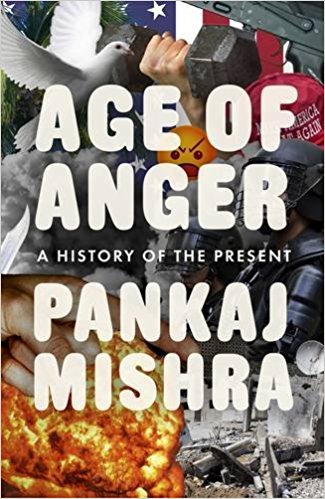
Age of Anger: A History of the Present (Allen Lane) by Pankaj Mishra
Ours is a violent, angry age. Some blame Islam or ignorance or their combination for this. Had it not been for Islamist terror, they say, all citizens of the world could have enjoyed the great advances of civilisation brought about by Western innovation. In his new book Age of Anger essayist and historian Pankaj Mishra finds a different culprit: the Enlightenment and one of its leading, most poetic critics, Jean-Jacques Rousseau.
Mishra points to contradictions thrown up by the French Revolution, which introduced to the world the idea of a “universal civilisation”, a secular system based on a sanctified notion of the individual and the freedom to speak, move – and, most importantly, trade – at will. In Mishra’s account, the Enlightenment was another name for a spirit of entrepreneurship realised by a “globally networked elite” of which the author Voltaire was a member; he exported watches and amassed a fortune, showing how “the hero of the new secular society was the entrepreneur – intellectual as well as commercial.”
Against self-enrichers like Voltaire, Rousseau staged an intellectual rebellion that proved long-lasting: he showed how, under the reign of commerce, freedom turns into a commodity. He argued that the English were under the illusion of being free because they participate in elections. “As soon as they are elected, the people are their slave, as if nothing.” His hatred for the establishment, according to Mishra, anticipated not only left-wing critics of globalisation but also Brexiteers.
For Rousseau, the prospect of a modern society imposing its structure on the world was a crime; unlike Voltaire, who attacked the Catholic Church and portrayed Prophet Mohammed as an oppressive figure, Rousseau “saw religion as having a crucial bearing on the morality of ordinary people; it also made the life of the poor tolerable.”
Fast forward to 2017. Globalisation, in Mishra’s reading, is a continuation of the entrepreneurial spirit of the Enlightenment. It is similarly revolutionary, a destroyer of the barriers of space and time and an alienator of the masses. The dispossessed, again accused of having false consciousness and ignorant beliefs, can now watch the lives of the rich in real time, in the form of Instagram stories, and the feeling of resentment has rarely been so widely shared. “Globalisation – characterised by mobile capital, accelerated communications and quick mobilisation – has everywhere rapidly weakened older forms of authority,” Mishra writes. “The shock waves emanating from the financial crisis of 2008 and Brexit in 2016 confirmed that, as Hannah Arendt wrote in 1968, ‘for the first time in history, all peoples on earth have a common present’.”
It is in this common present, where groups like ISIS have made use of our increasingly interdependent world, that these waves of anger and resentment have become mainstream. “The internet in their hands has turned into a devastatingly effective propaganda tool for global jihad,” Mishra writes, before adding next to them populist leaders who “have tapped into the simmering reservoirs of cynicism, boredom and discontent”. Mishra’s book helps us understand why India’s Modi, America’s Trump and Turkey’s Erdoğan have made electoral successes in the age of anger: it would be more surprising if they had not.
Age of Anger patiently excavates the thread of anger that connects Italian futurists, modern-day jihadists, 18th-century critics of the Enlightenment and American alt-right activists. Mishra skilfully ties his close reading of philosophical texts and historical anecdotes to a distant reading of current affairs of our day. The result is a history of ideas that reads like a novel. In his previous book, From the Ruins of the Empire, Mishra attempted to give a sweeping history of Asian intellectuals in the crucial moment of their encounter with modernity.
In that last book, Mishra showed how the idea of a universal civilisation, and the condescending way in which it was presented to non-Europeans, was met with an intellectually fascinating refusal to imitate the ways of the west. Age of Anger is a continuation of this intellectual excavation project. It is required reading for anyone who prefers to understand the angry and the dispossessed instead of demonising them.

